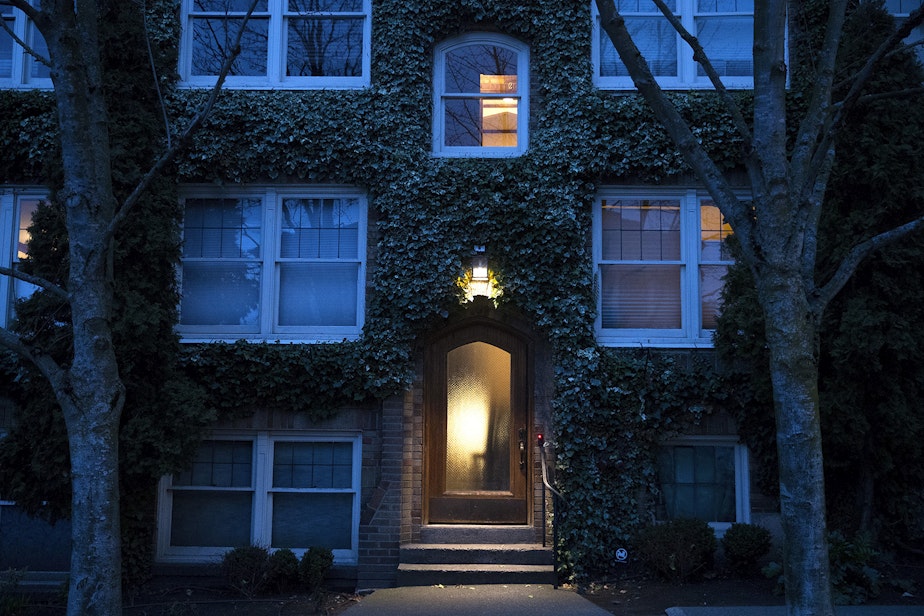Washington's renters are hurting. What about landlords?

It’s no secret that renters have been hit hard by the pandemic. And recently, bills at the city, state and federal level have tried to provide those renters with much needed relief.
But many of KUOW listeners have asked: What happens to the landlords?
We looked into it.
David Crowe and Britta Risner are landlords.
It’s not their main job. They own a couple houses between them. Crowe is a comedian, but he’s out of work. Risner is on disability, struggling with a chronic condition.
One of their tenants was already behind on rent when the pandemic hit. Now, he hasn’t made a payment for almost a year.
He’s still in the house because he’s under the protection of the state's eviction moratorium. He now owes his landlord tens of thousands of dollars.
“And so, all of the costs that are associated with that house we are paying without their rental payments covering it," Risner said. "We’ve burned through all of our reserves, that were pretty considerable reserves before this pandemic hit. And now, we can’t pay our own bills."
Sponsored
As landlords, they have to pay property taxes, mortgage payments, utilities — all the costs of being a landlord.
But here’s the irony: they're also tenants. Their primary residence is a house in Seattle’s Ravenna neighborhood, which they rent from another landlord. And now, they’re behind on their payments.
As a comedian, Crowe finds a tiny glimmer of humor in his situation.
“So it went from being the landlord, ‘Where’s my rent?’ to ‘Ah, I don’t have rent.’ So I feel like both puppets in the puppet show.”
In this way, the problems that renters face trickle up to landlords.
Sponsored
“Our discussions with each other have been, 'How do we get through this year?" Risner said. "What other things can we possibly do to keep ourselves afloat?”
We did reach out to Crowe’s tenant. He didn’t want to talk.
Right now, the eviction moratorium is keeping problems like this frozen in time. But they’re about to unfreeze. When the moratorium ends, suddenly, landlords and tenants are going to have a lot to work through.
In Olympia, lawmakers are working on a couple of bills that will influence how those conversations go. They would protect tenants from some kinds of evictions, and help them get free legal help. They’d allow tenants to pay off their debt slowly over time.
But at a recent hearing, some questioned whether they do enough for landlords. Representative Michelle Calder, a Republican from Port Orchard, asked: “Under the bill currently, if someone has not been paid since February of 2020, and all of this rent has accrued, what is the maximum someone can get from the mitigation fund, and would that be sufficient?”
Sponsored
“As the bill is currently written, that would be $5,000, which would be the equivalent of about three months of rent,” answered Brett Waller of the Washington Multifamily Housing Association.
Waller said his organization is currently against the bill, but is encouraged by the direction it's going and hopes to be able to endorse it eventually.
Many landlords in the hearing asked that the $5,000 cap to be raised.
For some perspective, I went to Morgan Shook. He’s a senior policy adviser with Economics Northwest. He’s been looking into the state’s approach, including the eviction moratorium.
“The first part was, 'Let’s halt evictions, which will keep people housed,' but then that created a cascading issue around providers, of how do I have income to do the things I need to do?”
Sponsored
Shook said he recognizes the concerns landlords have. But “if you focus on the renter first, then that income to pay the rent provides the needed remedy on the provider side.” And so relief will trickle up to help landlords too.
Shook is making an economic argument here. But advocates say it’s moral, too.
Renters tend to have fewer resources than landlords. So, loss of housing can become a life or death situation.
Dominique Horn lives in the Vancouver, Washington area. She lost her job and her housing recently, despite the eviction moratorium. She and her kids are now homeless.
“The last thing I packed in my house was the suicide hotline on my fridge. It had to be there at all times, in case anyone needed to access it if my children were in a crisis.”
Sponsored
Crisis is the right word for it. But there’s more financial help on the way, in the coming months. The American Rescue Plan includes $27 billions in aid for struggling renters nationwide.

